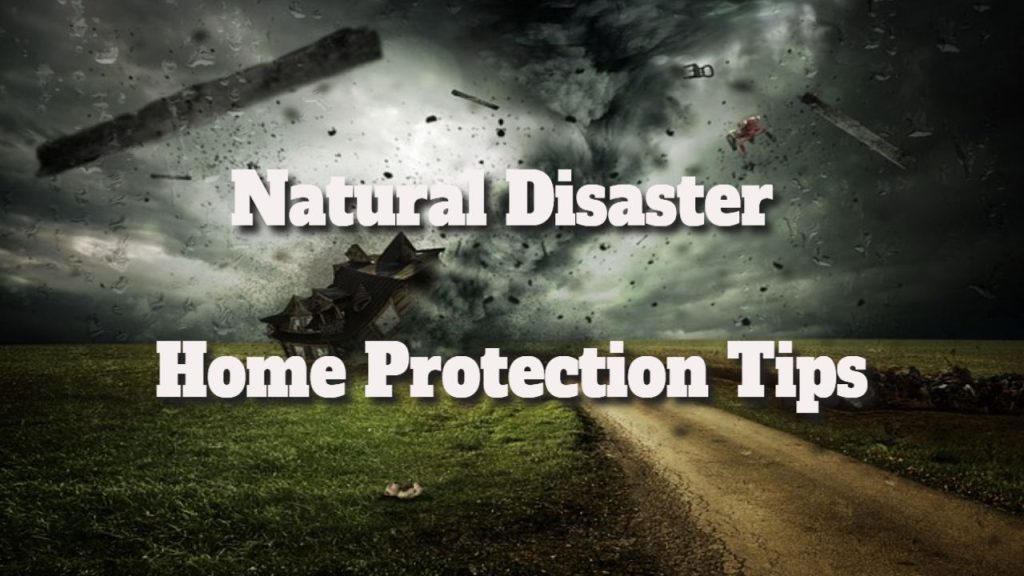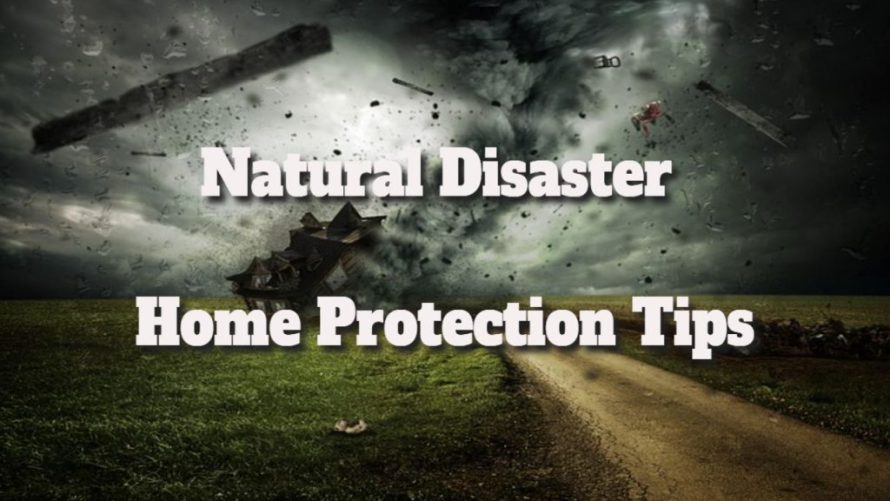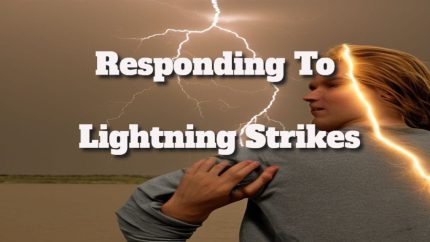Proactive Approaches to Safeguard Your Home Against Natural Disasters
Natural disasters present an unpredictable and often devastating threat to individuals, families, and communities. These catastrophic events can imperil lives and result in significant property damage that may take years to recover from. Recent statistics highlight that the financial repercussions of natural catastrophes and weather-related incidents in the United States can reach an astonishing $23.46 billion annually. Common perpetrators of destruction include floods, hailstorms, tornadoes, and earthquakes, each posing distinct challenges for homeowners. Therefore, it is imperative for everyone to adopt a comprehensive strategy to protect themselves and their properties. This article provides you with crucial insights and actionable strategies for preparing for these unpredictable events. By equipping yourself with the right knowledge and tools, you not only enhance your safety but also significantly increase your chances of safeguarding your life and property amidst nature’s fury.

Stay Informed and Enhance Your Preparedness for Natural Disasters
Staying informed is one of the most effective strategies for minimizing the risks associated with natural disasters. It is crucial to keep abreast of local weather reports and governmental updates, as timely information can be the difference between safety and danger. Regularly monitoring reliable news sources ensures you receive real-time updates about potential threats, enabling you to prepare your response accordingly. If you prefer to steer clear of traditional news outlets, consider subscribing to weather alert services or using mobile applications that send notifications directly to your phone. Beyond staying informed, it is also vital to assemble a comprehensive home emergency kit. This kit should include essential supplies such as flashlights, batteries, first aid kits, and non-perishable food items that can sustain you and your family through a crisis. Creating a family communication plan is equally important, ensuring that each member knows what to do and where to go in the event of an emergency. By proactively preparing and maintaining awareness of your surroundings, you significantly enhance your safety and readiness for any natural disaster that may occur.
Implement Robust Flood Prevention Techniques to Protect Your Home
Flooding can strike suddenly and with little warning, particularly during periods of intense rainfall or severe storms. To effectively protect your home from flooding, it is essential to understand the dynamics of water flow and accumulation around your property. Begin by assessing the slope of your yard; a well-maintained incline can help direct water away from your foundation, whereas flat areas may create pools of standing water. Various flood prevention strategies can be implemented to bolster your home’s resilience against flooding. For example, installing automatic drainage systems that activate when water levels rise can be an effective measure. Additionally, elevate or securely anchor outdoor items such as propane tanks and patio furniture to prevent them from being swept away during floods. If feasible, design your home to be above the anticipated flood level, ensuring that your living space remains secure even in extreme weather conditions. Furthermore, consider landscaping with native plants that can absorb excess rainwater, contributing to flood prevention while enhancing the beauty of your outdoor space.
Explore Additional Flood Defense Options:
Take Proactive Steps to Shield Your Home from Wildfire Risks
In the context of wildfires, no home is entirely safe from danger, making it crucial to adhere to evacuation orders when issued. Nevertheless, there are several proactive measures you can take to minimize the risk of fire damage to your property. Start by creating a defensible space around your home; this involves systematically clearing away dead vegetation and any debris that could serve as fuel for a fire. It is also prudent to relocate your firewood pile as far away from the house as possible while utilizing fire-resistant materials for your roofing and siding. Establishing a safe zone—typically a 5 to 10-foot-wide area around your home—can significantly mitigate fire risks. Within this zone, eliminate any combustible materials such as wooden patio furniture, opting instead for non-flammable landscaping options like rocks or gravel instead of mulch. Additionally, consider installing spark arresters on chimneys and using non-combustible fencing materials to further enhance your home’s defenses. By taking these measures, you can create a crucial layer of protection for your home against the looming threat of wildfires.
Comprehensive Hurricane Preparedness: Safeguard Your Property
Many homeowners mistakenly believe that safeguarding their property against hurricane damage is an insurmountable challenge; however, this perception is unfounded. While you cannot completely eliminate the risk of damage, you can take significant steps to minimize potential impacts. First, ensure that all entry points, particularly windows and doors, are properly sealed prior to a hurricane’s arrival, as these are often the most vulnerable points in your home. Installing plywood or storm shutters can prevent glass from shattering, thereby protecting your interior. Additionally, secure any outdoor items that could become projectiles or float away during high winds or flooding, including garden furniture, children’s toys, tools, and decorative items. Power outages are common during hurricanes, so it is wise to unplug all electronic devices and appliances to safeguard them. Furthermore, having a generator on standby can prevent food spoilage and maintain a level of comfort until the power is restored. Regularly reviewing your hurricane preparedness plan and ensuring that your family is familiar with it can greatly enhance your overall safety during these severe weather events.

Essential Tornado Preparedness: Safety Measures to Implement
Tornadoes can develop with alarming speed, often providing little to no warning, making it essential to be prepared at all times. The first step in tornado preparedness is to secure any items around your property that could become dangerous projectiles during a storm, including outdoor furniture, garden tools, and other loose objects. If your budget allows, consider investing in impact-resistant windows and wind-resistant roofing materials during your next home renovation. These improvements can significantly enhance your home’s ability to withstand high winds and flying debris, thereby reducing the risk of extensive damage. Additionally, it is crucial to create a designated safe space within your home where family members can gather during a tornado warning. This safe area should ideally be located away from windows and situated in a basement or small interior room on the lowest floor. Planning for tornado events and acting swiftly when warnings are issued can greatly increase your safety and the safety of your loved ones.
Assemble a Comprehensive Emergency Pack for Any Natural Disaster
Regardless of the type of natural disaster that may occur, having a well-stocked emergency kit readily available is absolutely essential. This emergency pack should contain sufficient non-perishable food items to sustain each family member for several days, alongside two to three liters of water per person. Furthermore, include important documents, personal prescriptions, flashlights, and batteries to ensure you have all necessary supplies during an emergency situation. While these items are vital, you may also wish to consider adding other useful supplies such as a multi-tool, a portable phone charger, and a first-aid kit to further enhance your level of preparedness. It is crucial to keep accurate track of your finances and emergency supplies. If you do not already have a financial safety net, consider obtaining parametric insurance to cover potential losses related to natural disasters, including earthquakes. By taking these proactive measures, you can ensure that your family is well-equipped to handle any unforeseen emergencies effectively.
Enhance Your Home’s Safety Features for Optimal Protection
Improving your home’s safety features is a pivotal step in disaster preparedness. Consider installing metal gutters to effectively manage water flow and prevent pooling around your foundation, which can lead to structural damage. Additionally, using metal strapping and ETICS (Exterior Insulation and Finish System) walls can significantly fortify your home’s structural integrity against severe weather conditions. Repairing any loose or damaged roofing is critical to prevent further issues during storms. If you reside in a hurricane-prone area, consulting a professional for the installation of hurricane-resistant PV (Polyvinyl Butyral) windows is advisable. These specialized windows are designed with impact-resistant laminated glass and durable aluminum frames, offering superior protection against harsh weather conditions. Investing in these safety enhancements can greatly increase the longevity and resilience of your home against the threats posed by natural disasters.
Formulate a Detailed and Effective Evacuation Plan
When disaster strikes, having a well-structured evacuation plan is absolutely essential for ensuring safety. This plan should outline multiple exit routes from your home and identify a safe meeting point for family members in the event of separation. It is crucial that everyone in your household is aware of the evacuation plan and understands how to execute it quickly and efficiently. Moreover, having a spare key or an alternative access method to your home can facilitate a rapid exit when necessary. Even a temporary barrier outside your property can provide valuable seconds to prepare for an emergency. If you live in areas prone to natural disasters, it may be beneficial to consult local damage restoration companies for expert guidance on preparing your home and accessing essential safety equipment. These professionals can offer invaluable insights tailored to your specific needs and the regional risks you face.
Recognizing the Importance of Comprehensive Insurance for Your Belongings
The importance of having comprehensive home insurance coverage cannot be overstated, especially in the face of natural disasters. These events can lead to extensive damage caused by wind, rain, frost, and lightning, making it essential to ensure you have appropriate coverage in place. Before purchasing insurance, conduct thorough research on providers that offer protection against all types of natural calamities. Some insurance companies may excel in customer service but lack comprehensive coverage options, so it is vital to scrutinize the fine print of your policy. Keep in mind that insurance rates can fluctuate based on the severity of damage and repair costs, so it is advisable to regularly consult with a qualified insurance specialist to ensure your coverage remains adequate and relevant. While you cannot control the unpredictable nature of disasters, you can take proactive steps to minimize risks, protect your home, and safeguard your family’s well-being.
The Article Home Protection Tips for Natural Disasters Appeared First On Survival Avenue.
Survival Water Bottles: Essential Gear for Emergencies
Why Survival Water Bottles are Essential for Emergency Preparedness Understanding the Significance of Hydration in Crisis Situations Survival Water Bottles: Maintaining hydration is vital for ensuring optimal bodily functions during emergencies. In scenarios where access to clean water is limited, sustaining proper hydration is crucial in preventing health complications associated with dehydration, which can include […]
Earthquake-Proofing Home: Essential Tips and Techniques
Comprehensive Guide to Understanding Earthquake Risks What Are the Primary Causes of Earthquakes? Earthquake-Proofing Home: Earthquakes primarily result from the dynamic movement of tectonic plates situated beneath the Earth’s surface. These geological plates are in a constant state of flux due to various geological processes. When these plates collide, slide past one another, or drift […]
Water Safety in Crises: Essential Tips and Strategies
The Crucial Role of Water Safety During Crises Identifying Water-Related Risks in Crisis Situations Water Safety in Crises: Crises arising from natural disasters, such as floods and hurricanes, or from human-induced events, like conflicts, frequently heighten water-related risks. During these challenging times, the security and quality of water supplies can be severely compromised, leading to […]
Survival Radio Options: Essential Gear for Emergencies
Comprehensive Guide to Different Types of Survival Radios Portable Handheld Radios for Emergency Situations Survival Radio Options: Portable handheld radios are essential components of any effective survival strategy, providing unparalleled portability and user-friendliness during emergencies. These devices are specifically engineered to be lightweight, making them perfect for activities like hiking, camping, or preparing for unforeseen […]







This discussion raises an important point about the often overlooked emotional toll of natural disasters in addition to the financial impact. During my experience volunteering after a local flood, I observed how traumatic these events can be for families. Beyond preparing homes with structural reinforcements and emergency kits, we should also consider psychological preparedness. This includes ensuring that individuals have access to mental health resources and community support, which can be equally crucial for recovery.
You bring up a crucial aspect of how we approach natural disasters that often flies under the radar. It’s refreshing to see someone highlight the emotional dimensions of these experiences. When you mention the trauma families go through, it’s a reminder that the impact of a flood or any disaster extends far beyond the physical damage. It lingers in the minds and hearts of those affected.
You’ve captured the emotional dimensions so well. It’s interesting to think about how trauma shapes not just individuals but entire communities. The aftermath of a disaster like a flood often leaves scars that aren’t as visible but can be just as damaging. For instance, I came across a study recently that looked at the long-term mental health effects on families who went through Hurricane Katrina. It highlighted how some children developed anxiety disorders years later, even if their homes were rebuilt.
You’ve touched on such a crucial aspect of trauma that often gets overlooked. The long-term psychological effects on communities can be incredibly profound. Trauma doesn’t just fade away; it lingers, reshaping the social fabric. It’s heartbreaking to think about those children who endured not just the immediate chaos of Hurricane Katrina, but are still grappling with anxiety years later.
I recently found some useful insights on emergency hydration that really emphasize the importance of staying prepared in the face of disasters, especially considering the lasting effects they can have on communities.
‘Emergency Hydration: Essential Tips for Survival’
https://survivalbite.com/emergency-hydration-essential-tips-for-survival/.
You’ve hit the nail on the head regarding trauma and how it weaves itself into communities like a stubborn thread in a worn-out sweater. It’s wild to think about how some of those kids from Hurricane Katrina are still navigating the emotional aftermath. It’s like they got a free pass to a horror show that never quite closes. The long-lasting effects of those experiences can reshape futures in ways we’re still trying to fully understand.
You raise such an important point about the long-lasting effects of trauma on communities. The social and emotional scars from events like floods or hurricanes often linger far beyond the physical damage, and it’s fascinating yet tragic how those impacts extend to the younger generations. The study you mentioned about Hurricane Katrina really highlights that nuanced aspect of recovery.
You bring up such an important point about how trauma can ripple through a community over time. The invisible impacts, like the ones you’ve mentioned with children developing anxiety after Hurricane Katrina, really highlight that recovery isn’t just about rebuilding homes. It’s about healing hearts and minds, too.
I’m glad you found the emotional aspects resonant! If you’re interested in exploring more about the lasting effects of trauma on communities, you might want to check out this insightful resource that delves deeper into these issues.
https://survivalbite.com/wild
You bring up a crucial aspect that often doesn’t get the attention it deserves. The emotional aftermath of natural disasters can linger long after the physical damage has been addressed. Your experiences as a volunteer really highlight how trauma impacts families on a deeply personal level. It’s not just about rebuilding homes or replacing belongings; it’s about healing hearts and minds.
You’ve highlighted a crucial aspect of disaster preparedness that often takes a backseat in discussions. Experiencing a natural disaster isn’t just about salvaging physical possessions or rebuilding structures; the emotional scars can run deep and affect families long after the waters recede or the winds die down.
Thank you for sharing your valuable insights! To further explore how we can collectively support emotional recovery after disasters, check out this resource that highlights important mental health initiatives and community support networks.
https://survivalbite.com/wild
Your article raises important points about the necessity of a proactive approach to natural disasters. I find it particularly relevant, especially considering how rapidly climate change is influencing weather patterns and increasing the frequency of such events.
It’s great to hear that the points in my article resonated with you. The impact of climate change on weather patterns feels increasingly pressing, doesn’t it? It’s almost as if we’re confronting a new reality where disasters are not just a possibility but a frequent occurrence. This shift makes it necessary for us to rethink how we prepare for and respond to these events.
I completely agree with you about the significance of a proactive approach to natural disasters. It’s striking how quickly the effects of climate change are becoming apparent; I often find myself thinking about the recent patterns in extreme weather. Just the other day, I read about how certain cities are rethinking their infrastructure because of flooding risks. It feels like a wake-up call for policymakers.
Your exploration of proactive approaches to safeguard our homes from natural disasters resonates deeply with me. Living in an area prone to severe weather, I’ve seen firsthand how crucial it is to be prepared. The staggering statistic you shared about the financial repercussions really underscores the necessity of taking preventive measures. It’s interesting to consider how this preparation not only protects our physical assets but also plays a significant role in our mental well-being.
You’ve highlighted a vital aspect of disaster preparedness that often gets overlooked—its impact on mental well-being. When we face the uncertainty of severe weather, knowing we have safeguards in place can ease that anxiety. It’s not just about protecting our homes; it’s about creating a sense of control in what can feel like an uncontrollable situation.
Your insights on safeguarding our homes against the unpredictability of natural disasters resonate deeply with me. Living through a hurricane a few years ago taught me firsthand how vital it is to have a proactive plan in place. The emotional toll of uncertainty, combined with the financial struggles that can follow, underscores the importance of preparedness.
Your experience really highlights just how raw and impactful living through a natural disaster can be. Surviving a hurricane is more than just weathering the storm; it’s about navigating the aftermath that lingers long after the winds have calmed. The emotional toll you’ve mentioned is something that often goes unnoticed in discussions around preparedness. Many people focus on physical preparations—like stockpiling supplies or reinforcing structures—but the mental and emotional aspects deserve just as much attention.
Your experience with the hurricane really emphasizes just how unpredictable nature can be. It’s one of those things that, until you live through it, you can’t fully grasp the emotional and financial repercussions. The uncertainty afterwards definitely sticks with you, even when the storm has passed.
Your experience living through a hurricane really hits home. It’s incredible how nature can so dramatically shift our sense of safety and security in an instant. The emotional toll you mentioned is something many don’t typically consider until they’re in the thick of it. It can feel overwhelming, knowing that one moment you’re going about your daily life, and the next, everything is in flux.
“I’m glad to hear that my insights struck a chord with you! If you’re looking for practical resources to enhance your preparedness, check out this helpful guide.”
https://survivalbite.com/wild
It’s pretty eye-opening to experience something like a hurricane firsthand, isn’t it? Those moments really reshape how we view our homes and safety. The emotional and financial impact can linger long after the storm has passed.
“I’m glad to hear that my insights resonate with you. If you’re looking to strengthen your preparedness plan even further, check out this resource that offers practical tips and strategies to help safeguard your home and peace of mind.”
https://survivalbite.com/LostFoods
Your exploration of proactive approaches to safeguarding our homes against natural disasters is incredibly timely and necessary. Having experienced a severe storm in my area last year, I can attest to the disruption it brings not only to our lives but also to our sense of security. It’s interesting how each disaster—be it floods or earthquakes—requires a tailored approach. For example, while I found investing in flood barriers handy post-storm, I also realized the importance of having a well-stocked emergency kit that includes essentials like medications, food, and even a portable charger for our devices.
Your experience with last year’s storm really highlights the unpredictable nature of these disasters and the need for tailored responses. It’s interesting how our personal experiences shape our understanding of preparedness. The flood barriers you mentioned definitely serve as a frontline defense, but it’s those smaller, often overlooked items in an emergency kit that can make all the difference in our day-to-day comfort and readiness.
Your discussion on proactive approaches to safeguarding against natural disasters resonates deeply, especially in light of recent climate shifts. In my community, a neighbor who experienced a major flood shared how early preparedness significantly eased their recovery process. They had implemented a home inventory and secured comprehensive insurance long before the disaster struck. It’s interesting how knowledge sharing can empower us—perhaps local workshops or online seminars could foster a stronger culture of preparedness. Additionally, integrating technology, like smart home systems that provide alerts during emergencies, can offer added layers of safety. Has anyone tried such solutions that they found effective?
This is such an important topic! I’ve always believed that being proactive about natural disasters can really make a difference in not just protecting property but also peace of mind. After experiencing a minor flood in my area last year, I realized how essential it is to have a plan in place. Simple things like having an emergency kit ready, knowing the local evacuation routes, and even talking to neighbors about shared resources can make a world of difference.
You make some excellent points about the importance of being proactive when it comes to natural disasters. Experiencing a minor flood firsthand can be a real eye-opener. Those moments force us to confront the reality of what could happen and what we might be unprepared for. The fact that you had that experience but still came away with a proactive mindset speaks volumes about your resilience.
You’re right; experiencing something like a flood really puts a lot of things into perspective. It’s easy to think we’re prepared for anything until we face a situation that shakes our confidence. That moment of realizing just how vulnerable we can be is tough but also a catalyst for change.
You’ve captured that feeling so well. It’s interesting how moments of vulnerability can lead to such profound reflections on our lives. I think about disaster preparedness often and how we can sometimes get overly comfortable in our routines, assuming that we have things under control. When something like a flood hits, it really shakes that illusion and forces us to confront what we rely on.
You bring up such a crucial point—how those moments of vulnerability really push us to reassess what we take for granted. It’s fascinating to consider how often we slip into a rhythm, believing we’ve got everything mapped out. I think that comfort can be a double-edged sword. On one hand, it creates a sense of stability; on the other, it can blind us to the reality that life has its unpredictabilities.
It’s interesting how those moments of disruption can cultivate such a deeper understanding of preparedness. Experiencing a minor flood definitely shifted my perspective; it served as a harsh reminder of how quickly situations can escalate. I remember standing by the window, watching the water rise, feeling that mix of anxiety and disbelief. It’s unsettling, yet it makes you realize how fragile our day-to-day lives can be.
I recently came across some practical insights on handling flash floods that complement your experience beautifully and could be really helpful for anyone looking to be more prepared.
‘Flash Floods – Essential Steps To Take When Caught Out’
https://survivalbite.com/flash-floods-essential-steps-to-take-when-caught-out/.
I completely resonate with your experience. That mix of anxiety and disbelief when facing nature’s wrath is something that stays with you. It’s remarkable how a moment of disruption can reveal our vulnerabilities and prompt a deeper understanding of what we can do to prepare.
It’s interesting how those moments of anxiety and disbelief can serve as powerful teachers. When we find ourselves faced with nature’s fury, it strips away a lot of the noise we deal with daily, doesn’t it? Suddenly, all the distractions fade, and we’re left grappling with something far more significant than our usual worries.
“I’m glad to hear that you relate! If you’re interested in exploring more about preparedness and resilience in the face of nature’s challenges, check out this insightful resource.”
https://survivalbite.com/wild
You capture that unsettling experience of watching a flood rise with such vividness—it’s a feeling that really sticks with you. When the unexpected happens, like a sudden flood, it can shake up our routine and remind us that our lives can change in an instant. That mix of anxiety and disbelief you mentioned is surprisingly common and often shared among those who go through similar events. It seems to hit home for many, making you realize just how fragile our day-to-day lives can be.
Thank you for sharing your experience; it truly highlights the importance of being prepared. I think you’ll find the insights in this article on handling flash floods extremely valuable—it’s a great resource for anyone looking to enhance their preparedness. Check it out here: [Flash Floods – Essential Steps To Take When Caught Out](https://survivalbite.com/flash-floods-essential-steps-to-take-when-caught-out/).
https://survivalbite.com/wild
It’s interesting how personal experiences can really shift our perspectives on preparedness. That minor flood you mentioned probably brought a lot of things into focus that most people don’t think twice about until it’s too late. Having an emergency kit ready is such a straightforward yet impactful step, and it’s one of those tasks that can easily be overlooked until you actually need it.
It’s great to hear your perspectives on this. Your experience with the minor flood really highlights how unpredictable nature can be, and how quickly things can change. It sounds like you’ve taken a lot of valuable lessons from that incident. Having an emergency kit is such an important step. It’s one of those things that can feel like a hassle to prepare, but when disaster strikes, having essentials on hand – like water, flashlights, non-perishable food, and first aid supplies – can really ease a lot of stress.
“I’m so glad you found this topic valuable! If you’re looking for more tips on disaster preparedness and how to create your own plan, check out this helpful resource.”
https://survivalbite.com/wild
This is such an important topic, and I appreciate the thorough perspective you’ve provided on safeguarding our homes against natural disasters. Living in an area prone to hurricanes, I’ve learned that preparation truly is key. Beyond just securing our physical spaces, there’s something to be said about the mental readiness we should cultivate as well.
It’s so relevant to discuss proactive strategies for disaster preparedness, especially as we see an uptick in unexpected natural events. I can relate personally to this topic—growing up in a coastal area, hurricanes were a regular concern for us. I remember my family prepping weeks in advance, storing water, food, and supplies. It really highlighted how important it is to have a plan. Not just for the immediate impact, but also for the after-effects, like insurance claims and recovery efforts.
Your experiences growing up in a coastal area really resonate with the realities that many face when it comes to disaster preparedness. Preparing for hurricanes sounds like a significant part of your upbringing, and it’s great to hear that your family took those proactive steps. It’s interesting how those early lessons stick with us, shaping our understanding of the importance of planning.
You bring up an important point about the dual nature of disaster preparedness. It’s not just about shielding oneself from the immediate chaos; it’s also about navigating the aftermath, which can often be as challenging, if not more so.
Thank you for sharing your experience! It really underscores the importance of preparedness. If you’re interested in enhancing your knowledge further, check out this resource for practical tips and strategies to help you and your family stay ready for any natural event.
https://survivalbite.com/wild
You make a solid observation about disaster preparedness. The concept can often feel like it’s all about getting through the initial storm—whether that’s a physical storm or any kind of crisis. However, it’s that journey in the aftermath that often sneaks up on us. After the chaos, people find themselves facing unexpected challenges like emotional stress, logistical hurdles, and the need for resources that might not be readily available anymore.
You’re right on the money about disaster preparedness. It’s a bit like that old saying: an ounce of prevention is worth a pound of cure. Getting ready for the heat of the moment is one thing, but dealing with the aftermath? That’s a whole other game. The chaos settles quickly, but the ripples can last for ages.
“I’m glad you found the discussion valuable! For more in-depth insights and practical strategies to boost your disaster preparedness, I recommend checking out this helpful resource: [Survival Bite](https://survivalbite.com/wild).”
https://survivalbite.com/LostFoods
Your experience really brings the issue of disaster preparedness to life. Growing up in a coastal area sounds like it offered a front-row seat to the realities of weather-related challenges. Prepping weeks in advance—that kind of foresight is both essential and often underrated. It’s fascinating how those early lessons stick with us, shaping our views on risk and resilience.
“Thank you for sharing your experience! It’s incredible how those preparations shape our understanding of resilience. If you’re interested in exploring more proactive strategies for disaster preparedness, check out this resource that can help you create a comprehensive plan!”
https://survivalbite.com/wild
Growing up in a coastal area certainly gave me a unique perspective on the unpredictability of nature. The reality of weather-related challenges can feel distant for those who haven’t experienced them firsthand, but being part of a community that actively prepares has its own lessons to impart. The preparation process isn’t just about physical stockpiling; it’s also about cultivating a mindset that values vigilance and adaptability.
“I’m glad you found my experience relatable! If you’re curious about enhancing your readiness even further, I recommend checking out this insightful resource that offers practical strategies for disaster preparedness.”
https://survivalbite.com/LostFoods
I appreciate the focus on proactive measures in safeguarding our homes against natural disasters—it’s a topic that often feels overwhelming due to the sheer unpredictability of these events. Your points about the financial repercussions are striking; it really puts into perspective just how crucial it is to prepare in advance.
I really appreciate how you shed light on the financial burden that natural disasters can have on households—$23.46 billion is staggering! It makes me think about how many people feel unprepared until it’s too late. I’ve started looking into creating an emergency kit for my family and backing up important documents digitally, which I wish I had done before. It’s also fascinating how technology is emerging to help us prepare; for example, weather apps and smart home devices that can alert us to incoming threats. Has anyone tried any new tech or tools that they’ve found helpful in their disaster preparedness plans? Would love to hear some practical experiences!
You’ve touched on a really important aspect of disaster preparedness that often gets overlooked—the financial impact. The statistics can be overwhelming, and it’s easy to feel at a loss when thinking about how to be proactive. Your initiative to create an emergency kit and digitize important documents is a great step. Many people underestimate how crucial these preparations can be until they find themselves facing an unexpected disaster.
Creating an emergency kit can feel overwhelming, but starting small makes it manageable. It’s great to hear you’re backing up important documents digitally—that’s such a smart step. I remember when I finally organized my own files; it brought me some peace of mind knowing they were safe.
“That’s a great point! If you’re looking to enhance your disaster preparedness, check out this resource for more practical tools and tips that can make a real difference for you and your family.”
https://survivalbite.com/wild
As someone who’s fortified my home against everything from tornadoes to rogue squirrels, I couldn’t agree more! I once attempted to outrun a hailstorm only to realize my car was more an improvised weather observatory. Proactive measures are crucial—even if it just means assembling a go-bag with snacks and a good book, because let’s be honest, if disaster strikes, I want to be entertained while I wait for help! Also, I’ve heard that investing in good insurance can be a lifesaver (pun intended). Who else has some quirky disaster prep tips?
It’s great to hear from someone who’s clearly putting in the work to prepare for the unexpected! Outrunning a hailstorm sounds like quite the experience—who knew your car could double as a weather observation center? Your proactive approach really highlights the necessity of being ready for anything life throws our way, whether it’s extreme weather or curious wildlife.
It’s funny how life often challenges our sense of control, isn’t it? Outrunning that hailstorm was a real reminder that nature has its own agenda, even when we think we’re prepared. I never thought about my car as a weather observation center, but in a way, it really does take on that role—especially with all the technology in modern vehicles.
It’s interesting how staying prepared can really make a difference; I recently came across some useful steps for handling unexpected flash floods that might be worth checking out.
‘Flash Floods – Essential Steps To Take When Caught Out’
https://survivalbite.com/flash-floods-essential-steps-to-take-when-caught-out/.
It’s so important that we approach the topic of natural disaster preparedness with a proactive mindset. I remember when my neighborhood faced a major storm a few years back; many homes were damaged because residents hadn’t taken steps to reinforce their properties. It really opened my eyes to how much knowledge and preparation can make a difference.
Your experience really highlights a crucial point in disaster preparedness. It’s fascinating—and a little unsettling—how much we often underestimate the potential impact of natural disasters until we’re face-to-face with one. Seeing neighbors unprepared during that storm must have been a bit of a wake-up call for many. It’s easy to think that these things won’t happen to us, right?
Ah, the ongoing battle against Mother Nature! I often find myself wondering if she has a personal vendetta against my carefully curated outdoor spaces and weekend barbeques. When I read about the staggering $23.46 billion in damages from natural disasters, I can’t help but imagine how much of that could have been saved had we just armed ourselves with a heaping dose of common sense—and maybe a couple of sturdy hurricane-proof garden gnomes.
This is such an important topic. I remember when Hurricane Harvey hit Texas a few years back—it really drove home how unprepared many were for such an event. We had a neighbor who lost everything because they didn’t have flood insurance. It’s shocking to think about how a little preparation can make such a big difference. I’ve started keeping an emergency kit and have been looking into home retrofit options for earthquake safety—definitely a worthwhile investment for peace of mind. I’d love to hear what other readers are doing to prepare for these types of disasters. Do you have any go-to resources or local organizations that help with this planning?
It’s striking to hear your firsthand experience with Hurricane Harvey. Those moments can really shift our understanding of vulnerability and resilience. The story of your neighbor highlights a crucial reality—preparation often isn’t something we think about until it’s too late. It’s great to see that you’ve taken the initiative to create an emergency kit and are exploring home retrofitting for earthquake safety. Those proactive steps are truly invaluable.
You bring up a really important point about preparation—it’s something that often gets overlooked until it’s too late. Hurricane Harvey was such a wake-up call for many, and it’s heartbreaking to hear stories like your neighbor’s. It really emphasizes how crucial it is to have things in order ahead of time, especially when it comes to insurance.
This topic resonates deeply, especially in light of recent weather events that have left many communities grappling with both the immediate aftermath and the long-term repairs. It’s striking to see how many people remain underprepared for the realities of natural disasters, often due to a mix of optimism and lack of resources.
You’ve touched on a critical issue that often falls under the radar until it’s too late. Natural disasters aren’t just events we see on the news—they are real threats that can fundamentally alter lives and communities, leaving behind fragmented lives and long recovery processes. Your point about the staggering financial impacts is particularly sobering. It’s astonishing to think that $23.46 billion can be attributed to these events annually in the U.S. alone. This statistic challenges us to think not just about our physical readiness but also about our preparedness in a broader financial sense.
You’ve highlighted something essential in our conversation about natural disasters. The human impact and the emotional toll often overshadow the financial implications, yet they are deeply intertwined. Losing a home feels far worse than just a number on a balance sheet—it’s a disruption that affects families and communities for years to come.
Ah, the age-old struggle of trying to keep the elements at bay while also figuring out how to fortify the house against nature’s mood swings! I always wonder if Mother Nature has an off switch for her drama—we could use it about now!
It’s funny you mention trying to keep the elements at bay; it really does feel like a dance with Mother Nature, doesn’t it? Her mood swings can be dramatic, from fierce storms to calm sunsets. I sometimes think about how we’ve built this incredible world around us, yet we still bear the brunt of whatever weather she decides to throw our way.
“Absolutely! If only we could turn down the drama. Speaking of home fortifications, check out some great tips and products that can help you weather any storm!”
http://survivalbite.com/wild
Your insights into the pressing issue of safeguarding our homes against natural disasters resonate deeply with many of us. Living in an area prone to severe weather, like those unpredictable tornadoes or flooding from heavy rains, has given me a firsthand perspective on the importance of being proactive rather than reactive when it comes to disaster preparedness. I cannot emphasize enough how crucial it is to think ahead and formulate a plan that encompasses not just physical safety measures, but also the emotional and mental preparedness that accompanies such unpredictable events.
You make such an important point about the need for emotional and mental preparedness alongside the physical safety measures. It’s often easy to throw ourselves into reinforcing our homes or collecting supplies because that feels tangible and manageable. But the uncertainty of things like tornadoes or floods can really mess with our heads. I’ve seen folks go through the motions of storm prep—boarding up windows, stocking up on food—while the anxiety about what might happen keeps gnawing at them.
“To further support your proactive approach to disaster preparedness, I’d like to share some valuable resources that can help you create a comprehensive plan for both safety and peace of mind.”
https://survivalbite.com/wild
It’s really eye-opening to see just how much financial damage natural disasters can cause each year. Living in an area that’s prone to floods, I’ve learned the hard way that being proactive is essential. I remember a few years back, I didn’t think much about securing my basement until it flooded—what a mess!